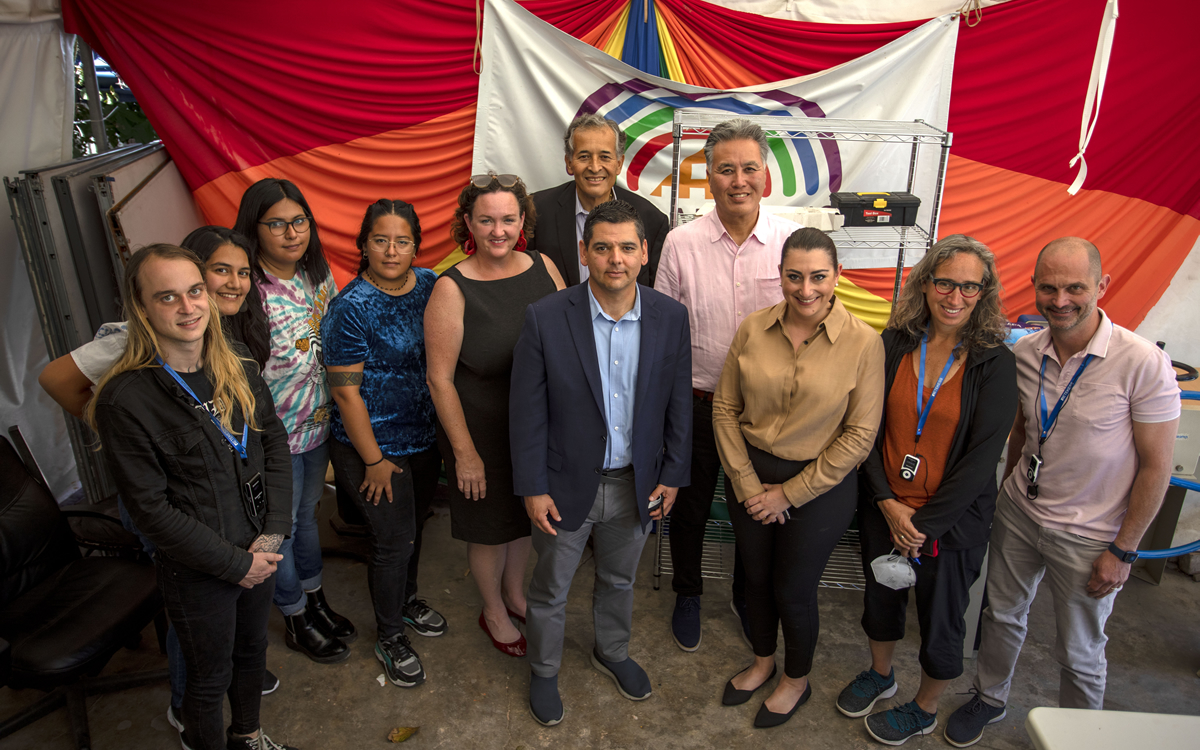Mexico
Five Calif. Congress members visit Tijuana shelters for LGBTQ asylum seekers
Delegation traveled to Mexican border city on May 6

Five members of Congress from California last week visited two shelters for LGBTQ asylum seekers in Tijuana.
Congress members Mark Takano, Raul Ruiz, Juan Vargas, Katie Porter and Sara Jacobs on May 6 toured Jardín de las Mariposas and Casa Arcoíris.
The Council for Global Equality organized the trip.
Chair Mark Bromley, Co-chair Julie Dorf and Senior Policy Fellow Bierne Roose-Snyder traveled to Tijuana along with Organization of Refuge, Asylum and Migration Executive Director Steve Roth. Representatives of the Transgender Law Center and the Refugee Alliance also met with the group.
The trip began in San Diego.
“As we work to fix our broken immigration system, improve border efficiency, and restore asylum at our borders, we must take a humanitarian approach and proactively protect all vulnerable populations lawfully seeking asylum in our country,” said Ruiz in a statement his office issued before the trip. “The LGBTQI community is one of the most vulnerable to face persecution, violence, and abuse in their home countries, throughout their journey to our borders, and in detention centers. As a trained humanitarian, I am going to assess their vulnerabilities and help provide humanitarian protections that are consistent with our American laws and their human rights.”
I visited Tijuana with congressional colleagues and advocates from @Global_Equality to learn more about the threats LGBTQ+ asylum seekers face and what we can do to help. I’ll never stop working for human rights for LGBTQ+ folks and asylees, on both sides of the border. pic.twitter.com/DTydCGJIEw
— Congresswoman Sara Jacobs (@RepSaraJacobs) May 7, 2022
The trip took place less than a month before the scheduled end of a Centers for Disease Control and Prevention rule that closed the Southern border to most asylum seekers and migrants because of the pandemic. The trip also coincided with the ILGA World Conference that took place last week in Long Beach.
Last week, ORAM was thrilled to welcome five US Congressmembers to El Jardín de Las Mariposas, an #LGBTIQ #refugee shelter in Tijuana that we partner with! ORAM ED Steve Roth spoke about ORAM’s support for the residents and ways that the congressmembers can show their support. pic.twitter.com/kDBJPsmYvQ
— ORAM (@ORAMrefugee) May 9, 2022
Mexico
Gay couple claims Puerto Vallarta wedding venue discriminated against them
Jeremy Alexander and Ryan Sheepwash wanted to get married at Sheraton hotel

A gay couple claims a hotel in a Mexican resort city that is popular with LGBTQ travelers discriminated against them when they tried to book their wedding.
Jeremy Alexander and Ryan Sheepwash in a TikTok video said they contacted the Sheraton Buganvilias Resort and Convention Center in Puerto Vallarta about holding their wedding at the property.
The couple, who live in Vernon, British Columbia, provided the Washington Blade with an invoice that Gabriela Espinoza, a wedding planner at the property, sent them on Jan. 17, 2025.
The invoice said 25 “deluxe ocean view room — all inclusive” rooms cost $970 a night. The total cost for the 25 rooms was $72,750.
Alexander in the TikTok video said it took Espinoza three months to send them the quote. The property, according to Alexander, requested a $36,000 deposit for half of the rooms.
“It’s not reasonable,” he said. “No one can afford that.”
Alexander said Espinoza told him and Sheepwash that the earliest they could have their wedding at the property was March 2027. Alexander in the TikTok video said he and Sheepwash asked a straight friend to “request a quote just to see apples to apples what it looks like.”
Ximena Esparza, another wedding planner at the property, on Feb. 7, 2025, sent the friend a quote for 25 rooms for a hypothetical wedding that was to have taken place from Feb. 19-26, 2026.
The quote for a “deluxe package” for 50 people was $8,500 and required a 20 percent deposit of $1,700.
“We just feel defeated,” said Sheepwash in the TikTok video. “It’s not fair because we love each other and we really want to get married, and we want to make it special and we want to make it perfect.”
@illuminaughtytriangle So disappointed that my fiancée and I got discriminated against by #Sheraton in #puertovallarta ♬ original sound – Jeremy Alexander
The Blade in 2019 reported the Sheraton Buganvilias Resort and Convention Center refused to allow Josh Rimer, a gay Canadian vlogger and television host who is also Mr. Gay Canada 2019, and his then-fiancé to hold their wedding at the property.
The invoice that Espinoza sent to Alexander and Sheepwash notes the hotel is “operated under license from Marriott International, Inc., or one of its affiliates.”
A spokesperson for Marriott, which is based in Bethesda, Md., and is Sheraton’s parent company, in response to Rimer’s allegation said the corporation reached out to him to express “our sincerest apologies for his experience.”
“We are troubled and greatly concerned about the experience reported by Mr. Rimer. Marriott has long been committed to providing an environment where all are welcome including our LGBTQ guests and their loved ones,” said the spokesperson. “In addition, we are looking further into the matter to better understand what happened and do what we can to prevent hurtful experiences like this from happening again.”
A Marriot spokesperson on Thursday told the Blade the company has “reached out to Mr. Sheepwash and Mr. Alexander to learn more about their experience and are working with the property to offer a solution.”
“The Sheraton Buganvilias has been active in the LGBTQ+ community in Puerto Vallarta for years, hosting LGBTQ+ weddings and groups and also supporting Pride events in Puerto Vallarta,” said the spokesperson. “Marriott remains steadfast in our commitment to ensure guests are treated with respect and understanding.”
Mexico
Trump executive orders leave LGBTQ migrants, asylum seekers in limbo
Suspension of US foreign aid may force shelters to close

MEXICALI, Mexico — Marlon, a 35-year-old man from Guatemala, used the CBP (U.S. Customs and Border Protection) One app to schedule an appointment that would have allowed him to enter the U.S. at a port of entry.
His CBP One appointment was at 1 p.m. PT (4 p.m. ET) on Jan. 21 in the Mexican city of Tijuana that borders San Diego. Marlon at around 11 a.m. PT (2 p.m. ET) on Jan. 20 learned his appointment had been cancelled.
President Donald Trump took office less than two hours earlier.
“We’re stuck,” Marlon told the Washington Blade on Jan. 31 during an interview at Posada del Migrante, a migrant shelter in the Mexican border city of Mexicali that Centro Comunitario de Bienestar (COBINA), a group that serves LGBTQ people and other vulnerable groups, runs.

The Trump-Vance administration’s immigration policies have left Marlon and many other migrants and asylum seekers — LGBTQ and otherwise — in limbo.
Daniela is a 20-year-old transgender woman from Tijuana who has lived at Jardín de las Mariposas, a shelter for LGBTQ migrants and asylum seekers in the city’s Obrera neighborhood, for a month. Jardín de las Mariposas is roughly six miles south of the Mexico-U.S. border.
She told the Blade on Jan. 29 during an interview that she was raped in Hermosillo, the capital of Mexico’s Sonora state, four months ago. Daniela said her roommate and five other people later tried to kill her when they “were drunk and on drugs.”
Daniela, like Marlon, had a CBP One appointment, but it was cancelled once Trump took office.
“I am completely alone both in Tijuana and elsewhere,” said Daniela. “I think the United States is a better option to be able to start over.”
Stephanie, a 25-year-old from El Paraíso, Honduras who identifies as a lesbian, arrived in Tijuana last July and lives at Jardín de las Mariposas.
She told the Blade her family is “very religious,” and she is the “only one in my family who is a member of the (LGBTQ) community.” Stephanie said a cousin in Louisiana agreed to allow her to live with her once she entered in the U.S., but she refused once she saw she had cut her hair.
“I felt a bit of freedom once I arrived here in Mexico … and I decided to cut my hair because it was very long,” recalled Stephanie. “One day she did a video call and she saw my short hair and she was like I cannot receive you; I cannot receive you because what example are you going to be to my son.”
Trump, in addition to shutting down the CBP One app on Jan. 20, issued several immigration-specific executive orders after his inauguration. They include:
• Declaring a national emergency on the Southern border
• Suspending the U.S. Refugee Admissions Program
• Ending birthright citizenship under the 14th amendment. (U.S. District Judge John Coughenour, who Ronald Reagan appointed, in a Jan. 23 ruling that temporarily blocked the directive described it as “blatantly unconstitutional.”)
Trump has reinstated the Migrant Protection Protocols program, also known as the “Remain in Mexico” policy that forced asylum seekers to pursue their cases in Mexico.
State Department spokesperson Tammy Bruce on Tuesday said Salvadoran President Nayib Bukele during his meeting with Secretary of State Marco Rubio “agreed to take back all Salvadoran MS-13 gang members who are in the United States unlawfully,” and “promised to accept and incarcerate violent illegal immigrants, including members of the Venezuelan Tren de Aragua gang, but also criminal illegal migrants from any country.” The Department of Homeland Security in a press release notes Tren de Aragua members were on the first U.S. military “flight of criminal aliens” that arrived at the Guantanamo Bay Naval Base in Cuba on Tuesday.
Jardín de Las Mariposas Director Jamie Marín on Jan. 29 told the Blade that Trump’s policies have sparked “a lot of fear.”
She said some of the shelter’s residents who had their CBP One appointments cancelled have either returned to their countries of origin or have found another way to enter the U.S., including with the help of smugglers who are known as “coyotes” in Mexican Spanish. Marín said Jardín de las Mariposas is working with those who have decided to stay in Tijuana to help them secure identity documents and employment.
“Our goal was to be a temporary shelter to move to the United States,” she told the Blade. “Now it’s almost becoming like we’re going to become a permanent shelter until we find another solution for them.”

Susy Barrales is president of Casita de Unión Trans, a trans support group that she founded in Tijuana in 2019 after she was deported from the U.S.
She told the Blade during a Jan. 30 interview at her office, which is a few blocks from the border, that two migrants who the U.S. deported arrived at Casa de Unión Trans the day before without medications. Barrales, like Marín, said the Trump’s immigration policies have sparked concern in Tijuana.
“He is doing this political campaign,” said Barrales in response to the Blade’s question about Trump’s policies. “I think it is something political, a political strategy that he wants to do, as a way to slow down immigration. This is why he makes these types of racist comments against migrants and against the community.”
Situation along Mexico-US border is ‘tense’
The Trump-Vance administration’s decision to suspend nearly all U.S. foreign aid spending for at least 90 days has had a direct impact on Mexican organizations that serve LGBTQ migrants and asylum seekers.
Casa Frida works with upwards of 300 LGBTQ asylum seekers and migrants in Mexico City and in the cities of Monterrey and Tapachula. Sixty percent of Casa Frida’s annual budget comes from U.S. government grants — specifically from the U.S. Agency for International Development, the State Department, and its Office to Monitor and Combat Trafficking in Persons.
Casa Frida Director Raúl Caporal on Monday told the Blade the U.S. on Jan. 24 suspended funding for five of his organization’s initiatives.
A poster inside COBINA’s offices on Jan. 31 contained a QR code that brought migrants to a WhatsApp page that had information about how they could “migrate informed and legally.” The State Department partnered with Partners of the Americas, a Washington-based NGO, on the initiative.
Maky Pollorena, a Mexicali-based activist who volunteers with COBINA, told the Blade the WhatsApp page stopped providing information on Jan. 24. Pollorena also said COBINA and the majority of migrant shelters in Mexico’s Baja California state of which Mexicali is the capital have lost between 50 and 70 percent of their funding.
“All of us who are in Baja California’s border strip are tense,” said COBINA President Altagracia Tamayo.

Marín noted Jardín de las Mariposas’ funding does not come from the U.S. government, but rather from the Transgender Law Center and other NGOs that include AIDS Healthcare Foundation. Baja California Gov. Marina del Pilar Ávila’s administration donated the building in which Jardín de las Mariposas is located. The International Organization for Migration, the U.N. High Commissioner for Refugees, and the Organization for Refuge, Asylum and Migration are also support Jardín de las Mariposas.
Despite this lack of dependence upon U.S. government funding, Marín said the Trump-Vance administration’s policies could prove deadly.
“These decisions from the Trump administration are going to cost a lot of lives for the LGBT community, not only here,” she said. “It’s also going to cost a lot of lives in the United States.”
Mexico
Mexican group that serves LGBTQ migrants may close without US funding
60 percent of Casa Frida’s annual budget comes from Washington

Editor’s note: International News Editor Michael K. Lavers is on assignment in Mexico to cover the impact that President Donald Trump’s immigration policies are having on LGBTQ migrants and asylum seekers.
MEXICO CITY — The Trump-Vance administration’s decision to freeze nearly all U.S. foreign aid spending for at least 90 days could force a Mexican organization that serves LGBTQ migrants and asylum seekers to close.
Casa Frida works with upwards of 300 LGBTQ asylum seekers and migrants in Mexico City and in the cities of Monterrey and Tapachula.
Casa Frida Director Raúl Caporal on Monday told the Washington Blade during an interview at his Mexico City office that 60 percent of his organization’s annual budget comes from U.S. government grants — specifically from the U.S. Agency for International Development, the State Department, and its Office to Monitor and Combat Trafficking in Persons.
Caporal said the U.S. on Jan. 24 suspended funding for five Casa Frida initiatives that specifically focused on “organizational strengthening, humanitarian assistance, financial inclusion, digital security” and fighting human trafficking.
Secretary of State Marco Rubio on the same day directed State Department personnel to stop nearly all U.S. foreign aid spending for 90 days in response to an executive order that Trump signed on Jan. 20. Rubio last week issued a waiver that allows the President’s Emergency Plan for AIDS Relief and other “life-saving humanitarian assistance” programs to continue to operate during the funding freeze.
“All of these (Casa Frida) services are now extremely limited and compromised because the suspension was immediate,” Caporal told the Blade.
He said Casa Frida has already laid off several staffers. Caporal also told the Blade the U.S. funds that remain in Casa Frida’s bank account may have to be returned to Washington.
“That implies many problems,” said Caporal. “It’s not only the continuity of our services, but it also puts the organization’s future at risk.”
Casa Frida has already laid off several staffers. Caporal told the Blade that he and his colleagues are working with the European Union, foreign governments, local officials, and private donors to find additional funding sources.

The waiver that Rubio issued notes it does not apply to “activities that involve abortions, family planning conferences” and “gender or DEI ideology programs, transgender surgeries, or other non-life saving assistance.”
Caporal said there is a chance the White House could extend the funding freeze in order to “review which international cooperation projects align or coincide with the current administration’s political interests.”
“We are quite certain that much of this aid is going to return,” he said. “But (Trump) since the campaign has made it very clear that nothing, not a single dollar for the LGBT community, or for sexual rights, reproductive rights, women, migrants.”
“It is therefore very possible that projects that have more to do with eliminating inequality gaps, poverty, urban development, etc., will return,” added Caporal. “But we are not waiting for these projects to be reactivated.”
Casa Frida is among the global LGBTQ organizations dependent upon U.S. support that have been left scrambling. The Blade is in touch with several of them that may have to curtail programming or even close if they cannot secure alternate funding sources.
The Blade will update this story.
-

 U.S. Federal Courts4 days ago
U.S. Federal Courts4 days agoFederal judge blocks Trump passport executive order
-

 Obituary4 days ago
Obituary4 days agoLocal attorney, LGBTQ rights advocate Dale Sanders dies at 75
-

 Mexico4 days ago
Mexico4 days agoGay couple claims Puerto Vallarta wedding venue discriminated against them
-

 Books3 days ago
Books3 days ago‘Pronoun Trouble’ reminds us that punctuation matters










